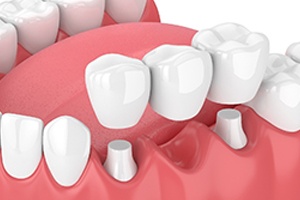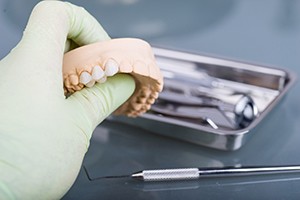
Dental Bridges – Northborough, MA
Convenient and Quick Tooth Replacement

Even a single missing tooth can contribute to numerous oral health problems, including dental drift and a misaligned bite. It can also have a negative effect on your smile’s aesthetics. Fortunately, modern dentistry offers a number of tooth replacement solutions. One popular way to fill in a gap is via a dental bridge in Northborough. On this page, you will learn more about what dental bridges are, what is involved in the procedure, and how much you might expect to pay for one.
Why Choose Northborough Dental Associates for Dental Bridges?
- All-porcelain restorations available
- Replace multiple teeth in a row
- Enjoy long-lasting function
What Are Dental Bridges?

There are a few different types of dental bridges. The most common type of bridge, often called a traditional bridge, is made up of three units. It has a crown on each end, which get cemented onto the teeth that surround an empty space in the mouth. One or more artificial teeth, called pontics, are supported by the crowns. They “bridge” the gap. Another common type of bridge is a cantilever bridge, which has a crown on only one side. The best type of dental bridge is one that is supported by dental implants instead of the natural teeth.
The Dental Bridge Procedure

The procedure for placing a dental bridge usually requires at least two appointments. First, we prepare the teeth that will receive the crowns by modifying their shape. Then, we take impressions of your mouth and use them as the basis for designing your bridge. You will wear a temporary bridge while a laboratory fabricates your permanent one. Once it is ready, you will return to our office to have the bridge attached to your teeth.
Candidates for Dental Bridges

A dental bridge may be ideal for you if you are missing 1 – 3 teeth in a row. Your abutment teeth (the teeth that will receive the crowns) should be strong enough to support the restoration. Many patients who opt for a traditional bridge are budget-conscious; a traditional bridge presents a lower upfront cost than implant-supported tooth replacement. However, keep in mind that implant-supported teeth tend to have a longer lifespan and offer a greater level of durability and stability.
When you visit us for your consultation, we will thoroughly explain all of your restorative treatment options and help you choose the one that is the best fit for your circumstances.
Cost of Dental Bridges

The cost of your bridge will depend on a few factors, including:
- The materials used to make it
- Whether it is a traditional or implant-supported bridge
- How many teeth you need to have replaced
We will be upfront with you about our pricing structure and help you explore your payment options. In most cases, dental insurance is willing to cover about half the cost of a dental bridge, up to the amount of the policy’s annual maximum. Our team will be happy to help you navigate your coverage and file your claims. We also accept financing if you would like to pay for your bridge over time.
Are you hoping to replace one or more lost teeth? As your trustworthy dentist in Northborough, our team is ready to help. Contact us today to schedule your personalized consultation.